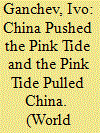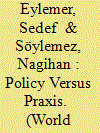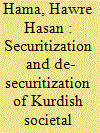|
|
|
Sort Order |
|
|
|
Items / Page
|
|
|
|
|
|
|
| Srl | Item |
| 1 |
ID:
184235


|
|
|
|
|
| Summary/Abstract |
This article examines the rise of leftist ideology in Ecuador and Bolivia in light of their deepening economic relations with China from 2005 to 2014. First, it reveals that market trends account for trade fluctuations but fail to explain Chinese investment in, and some loan deals with, Ecuador as well as loans to Bolivia. Second, it demonstrates how these forms of funding provided alternatives to U.S.-led international institutions, enabling Rafael Correa and Evo Morales to steer away from Western influence. Third, it contends that four factors led to a cyclic reinforcement of Chinese economic interests and the rise of leftist ideology in Ecuador and Bolivia, namely: mutual complementarity between China’s demand for energy/natural resource supply diversification and Pink Tide development agendas; U.S.–China geopolitical competition for influence in Latin America; China’s experience in engaging with leftist governments from developing countries; and anti-Americanism shaping national identity in Ecuador and Bolivia.
|
|
|
|
|
|
|
|
|
|
|
|
|
|
|
|
| 2 |
ID:
184236


|
|
|
|
|
| Summary/Abstract |
We investigate persistence and determinants of deaths from conflicts in a sample of 163 countries for the period 2010–2015. The empirical evidence is based on the Generalized Method of Moments. First, the findings are contingent on income levels, religious domination, landlockedness, regional proximity, and legal origins. We find that the persistence of deaths in internal conflict is more apparent in coastal, French civil law, and Islam-oriented countries, compared to landlocked, English common law, Christian-oriented countries, respectively. Second, the following factors are generally responsible for driving deaths from internal conflicts: homicides, conflict intensity, and conflicts fought. Furthermore, incarcerations have negative effects on internal conflicts. Justifications for the established tendencies and policy implications are discussed.
|
|
|
|
|
|
|
|
|
|
|
|
|
|
|
|
| 3 |
ID:
184234


|
|
|
|
|
| Summary/Abstract |
Putnam’s seminal work on social capital focused on early forms of health insurance as both a result, and accelerator, of the norms of reciprocity and social trust that foster cooperation. Yet, while social capital has been studied as a factor supporting community-based health insurance in developing countries, there has been no analysis of its role in U.S. health insurance. With repeal of the mandate to carry health insurance, this product is once again a purely voluntary purchase, and bears analysis as a cooperation problem. Putnam later documented a sharp decline in social capital in the United States. If social capital undergirds participation in health insurance, we can expect reduced reciprocity to lower willingness to cross-subsidize the sick. Waning social capital could also manifest itself in reduced trust that other healthy people will purchase insurance and lack of trust in the providers and manufacturers who make claims on the insurance pool.
|
|
|
|
|
|
|
|
|
|
|
|
|
|
|
|
| 4 |
ID:
184233


|
|
|
|
|
| Summary/Abstract |
This study analyzes the effects of supranational governance on the refugee crisis in the European Union (EU). The main argument is that the supranational institutions of the EU have often failed to adequately manage the refugee crisis according to its foundational principles of fair burden sharing and solidarity. This failure has gradually discredited the Union’s basic normative principles such as solidarity, hospitality, and respect for human rights. We show that the gaps between certain policies adopted at the Union level and the practices at the national level have widened, and this has led to a familiar defeat of the normative domain by realpolitik, following some central tenets of classical realism. We aim to show that in several areas of EU policy, as well as how individual states have responded to them, national interests and burden shirking, rather than sharing, have unfortunately prevailed.
|
|
|
|
|
|
|
|
|
|
|
|
|
|
|
|
| 5 |
ID:
184232


|
|
|
|
|
| Summary/Abstract |
The four countries hosting Kurdish populations in the Middle East have mainly been politically centralized in character and sought to follow a homogeneous nation-state model through the assimilation of their Kurdish communities. Drawing on the concepts of societal security, securitization, and de-securitization derived from the theories of the Copenhagen School, this article examines Kurdish (in)security in the Middle East and argues that the Kurds have experienced significant societal insecurity due to the adoption of assimilation strategies by their host states. I posit that federalism and power sharing are the two obvious de-securitization strategies that may address the securitization of Kurdish identity in the states with significant Kurdish populations. I further argue that, while the federal model has appeared to manage securitized Kurdish identity in Iraq since 2003, this solution may not be applicable to Turkey, Iran, and Syria. Alternatively, consociational power sharing as a form of institutional de-securitization carries the potential to address Kurdish identity in these countries.
|
|
|
|
|
|
|
|
|
|
|
|
|
|
|
|
|
|
|
|
|